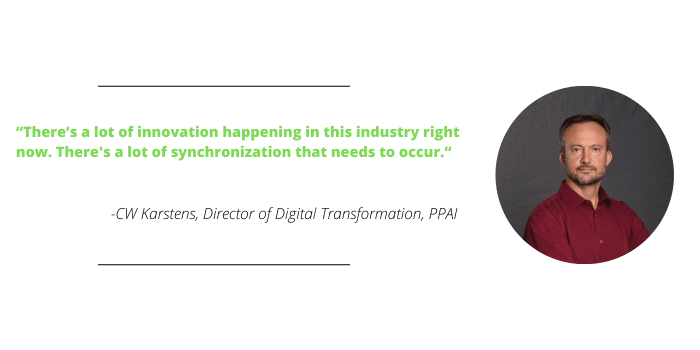After an extensive search, PPAI has hired CW Karstens as the Association’s director of digital transformation.
- Karstens will lead the Association’s drive toward helping the promotional products industry adopt and leverage digital tools to create efficient, secure and effective practices.
- Previous to joining PPAI, Karstens worked in the automotive, telecom and financial technology industries.
- Digital transformation is an evolving metric in the PPAI 100 list.
A Natural Problem Solver
Karstens might have been destined from an early age to solve problems through technology. His father worked moonlighting jobs in construction and would teach a young Karstens how to tinker. He gravitated toward the engineering aspects of how things come together.
- He obtained a degree in mechanical engineering at Texas A&M.
Out of college, Karstens started his career in the automotive industry.
- Getting his footing in the manufacturing space, he worked on operational improvements.
- He also got an early glimpse of robotic enhancements and automation to reduce manual tasks in the automotive industry in the late 1990s.
With the automotive industry flattening a bit at the turn of the century, Karstens joined the booming telecom industry, working for Nortel Networks for nine years.
- Karstens eventually earned the title enterprise tech support manager.
- He led a team that managed the U.S. federal government’s phone systems.
- For example, if a military base’s phone system or the Social Security Administration’s phone system went down, Karstens’ team would be brought in if the on-the-ground support couldn’t solve the problem.
In 2012, Karstens left telecom for another industry primed for opportunities: financial technology.
- He joined a small team at StoneEagle, working in divisions that were purchased by larger companies such as VPay and then eventually Optum in 2021.
- Financial technology gave Karstens room to innovate. He was product manager and VP of operations for an app that streamlined worker’s compensation by enabling wage replacement through debit card, direct deposit, checking account or physical check, which at the time was a big breakthrough for employees and employers.
“[Financial technology] was an innovative industry in those days,” Karstens says.
- Optum attempted to build their own version of Karstens’ product, eventually settling on purchasing it. Karstens joined the company to handle integration.

His Role At PPAI
There’s been a trend in Karstens’ career of joining industries at a time when they were ripe for transformation, allowing him to be a part of that progress forward. In his opinion, the promo industry is at that point right now.
“There’s a lot of innovation happening in this industry right now,” Karstens says. “There’s a lot of synchronization that needs to occur.”
That synchronization is a long-term goal for Karstens is his role. There’s no question that the industry could be more efficient in areas such as order processes, and there’s even less doubt that the technology to implement that efficiency exists. But finding the right solutions that meet the needs of the most promo companies and won’t leave distributors or suppliers behind is a complex journey.
- Karstens will be heavily involved in the push forward for PDX, an open standards formula supported by PPAI.
- Upon joining the Association, Karstens says he is a “sponge” when it comes to PDX, and he wants to first fully comprehend “what it can do today” before bringing any new initiatives to it.
Karstens says the director of digital transformation role will initially involve a lot of learning, but that he thinks he is the right person for the job.
“The role fits nicely with my operational skill set,” Karstens says. “I love the innovation aspect, finding the proper solutions for the challenges that an industry is facing.”
- The difference between promo and the other industries Karstens has worked in is that there are so many differing entities, and as an association, Karstens and PPAI are meant to represent the best interests of all PPAI members.
“I think the multipoint to multipoint connection is the difference,” Karstens says. “It’s more of a convoluted cross matrix.”
Karstens says he has a general framework for getting his footing in the industry, which is as follows:
- Understanding current capabilities.
- Understanding who the stakeholders are.
- Understanding their needs.
- Deciphering what is a common solution versus a tailored solution.
“It’s about learning,” Karstens says. “Then it’s about strategy.”


